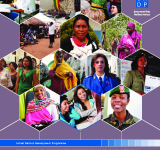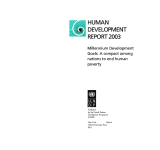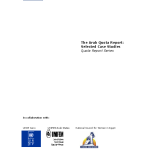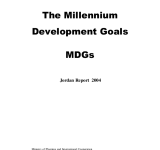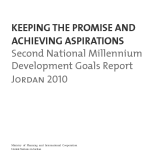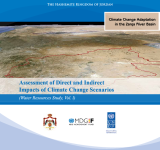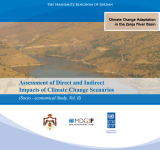UNDP
This report provides an assessment of the Millennium Development Goals;; laid out by the UN Millennium Declaration. The UN Millennium Declaration was adopted in September of 2000 as a commitment on the part of the world's leading nations to reduce poverty;; improve health and promote peace;; human rights;; and environmental sustainability. The Millennium Development Goals are specific;; measurable targets that aim to reduce extreme global poverty by the year 2015. This report analyzes the challenges and barriers to meeting these goals as of 2003;; examining the successes and failures of various nations and the gaps that exist between regions and countries with regards to economic growth and human development. This report then examines the successes and failures of public and private policies with regards to hunger;; health;; water and sanitation;; education;; and environmental sustainability. This report also analyzes the participation of civil society throughout the world and the mobilization of grassroots support for the various human development goals. Finally;; this report presents a number of recommendations on what countries can do to best support these goals.
This report was compiled from the findings and case studies presented at a workshop held on 5-6 December 2004;; in Cairo Egypt. This report contains an overview on global trends and regional analyses;; implementing legislated quotas for women;; quota adopted by political parties;; methods on enhance women’s participation;; and the role of the international community and international instruments. The international IDEA had convened a series of regional workshops to gather qualitative data. The report also has 6 case studies about women’s participation and quota include comparative experiences with quotas;; address the culture challenges to women’s representation in the Arab world;; and point the opportunities that could be seized in order to meet those challenges.
The Millenium Development Goals Report has been prepared through the active participation of the Jordanian Government and the UN Country Team. As scorekeeper of the MDGs;; UNDP supported the Ministry of Planning and International Cooperation in this joint endeavor. The objectives of this report are to create a baseline situation;; monitor progresses made to date;; and indicate what should be done in order to achieve the MDGs. The concluding section of fostering global cooperation gives an overview of national efforts to strengthen the basis and improve the environment for developing strong partnerships to achieve macroeconomic stability and other important national objectives.
Jordan’s second Millennium Development Goals Report 2010 shows the extent to which progress has been made towards achieving those targets and highlights the challenges that still confront the country to achieve these goals. The report seeks to identify the policies required for meeting the MDG targets by the year 2015;; at a time when the United Nations and the World’s governments are exerting a collective effort to review the progress achieved to date and identify the obstacles standing in the way of meeting the goals and targets by 2015.
This document is the result of the assessment of Climate Change impacts on water resources of the Zarqa River Basin (ZRB). It details the impact on the quality and the quantity of both the surface and groundwater resources of the basin. It is hoped that this study will be a motivator for other studies in other basins of the country.
The study aims at optimizing the water allocation in the Zarqa River Basin (ZRB) through maximizing the net value added by considering the climate change scenarios developed by the team of the study. The current water allocation suffers from unmet demands. In the future;; more wastewater will be produced and more treated wastewater is expected to be used due to the increasing population and the increased connection rate and rehabilitation and expansion of the existing treatment plants;; allocating more treated wastewater for the irrigation sector would save the fresh water sources for the municipal sector. Currently the irrigation sector suffers high amounts of losses. An improvement in efficiency would contribute in saving more fresh water too. Volume One is a Water Resources Study and Volume Two is a Socio - economical Study.
